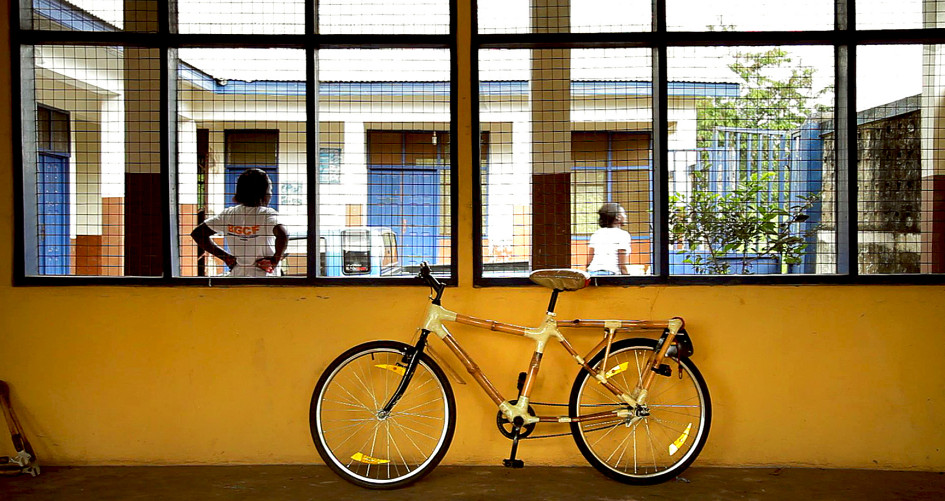The Ghana Bamboo Bike Initiative tackles climate change and provides work and a means of transport for local communities in Ghana. We meet its founder, Bernice Dapaah, to talk about her 2013 Global Climate Action Award, and what makes bamboo so special.
There is a truism among the entrepreneurial community that the easiest way to come up with an idea is to solve a problem you already have. That is something Bernice Dapaah took to heart when she set up the Ghana Bamboo Bike Initiative in Kumasi, the capital of Ghana’s Ashanti region.
As a child, Bernice had to walk many miles to school and back, until one day, her grandfather bought her a present: a brand-new bike. “We would grow our own food, and we would wake up early to farm and get ready for the day, and then I would have to walk many miles to school.” Of course, a long walk to school and back has multiple knock on effects: students are too tired to concentrate in school, or focus on their homework, and precious hours of daylight are spent getting to and from school.
The bike meant she could wake up later, have more energy to do homework, and spend more time helping around the house and the small farm.
Perennial Favourite
She has also long been intrigued by bamboo, influenced by her grandfather, who was a forester. “Bamboo is fascinating. My grandpa grew it wild and so I was always around bamboo. I saw how strong bamboo is, and I would see people making chairs out of them, and realized it could be used to make other things.”
Aside from the obvious sustainability benefits, bamboo bikes offer a number of advantages over traditional metal-framed bikes. Bamboo is naturally flexible, and results in a softer ride, due to better shock absorption. And, as bamboo is made from interwoven fibres, it is very resilient and lightweight.
Bernice co-founded the Ghana Bamboo Bike Initiative in 2009, determined to be her own boss, and give something back to the local community. “I wanted to do something to help myself, but also help the community,” she says. The social enterprise had multiple benefits: it provided employment for local young people, meant there was an affordable, environmentally sound alternative to cars and motorbikes, and the planting of bamboo helps to prevent soil erosion, an issue for Ghana’s farmers.
Above: Bernice Dapaah, founder of Bamboo Bikes; Main image: A Bamboo Bike outside a school in Ghana.
Of course, as any entrepreneur will tell you, there is a big difference between having an idea and bringing that idea to market. “It took about a year to build the first prototype bike,” Bernice says. “There was a lot of trial and error, and it was a project I kept going back to while doing other things. We kept experimenting with it, and after about two or three years, we had a product we could sell.” Even when the prototypes were ready, there were lots of doubts if a bamboo bike could be a viable product. “Some of my friends working on the project are engineers, and they would ask me if I really thought a bamboo bike would work, but I always believed it would,” Bernice says.
Deserved Recognition
Bernice’s innovation has won many awards, but the UN Climate Change Global Climate Action Award she won in 2013 stands out. “For a young entrepreneur, having that level of visibility was huge,” she says. “We were able to network with everyone at the event and make new contacts. And we even had (the then UN Secretary General) Ban Ki-moon sitting on the bike. Can you imagine the UN Secretary General sitting on your bike! It was a huge moment and opened a lot of doors,” Bernice adds.
In general, Bernice is optimistic about the future of the planet, and she has seen a change in attitudes towards climate change in Ghana in recent years. “More and more people here are aware of climate change and make decisions about what they buy based on it,” she says. “I think there is a lot of hope that if we continue on this path, we can all make a difference, but we need to all keep working hard towards that goal.”
Her own plans include expanding her workshop so she can hire more locals and sell more bikes, something which will be a win-win situation both for the local community and the planet. “Bamboo is good at absorbing carbon, so the more we plant, the better,” she says. “And the more people who cycle, the less emissions there are, and the healthier the people get.”
So far, Bamboo Bikes has sold more than 4,000 and donated more than 1,000 to local communities, ensuring a new generation of Ghanaians can cut their school commute times, and help both their health and the planet.
The call for entries for the 2021 Global Climate Action Awards are now open. Enter here.
